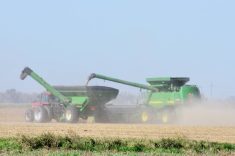Railway service for Western Canada’s grain shippers was “highly variable and timeliness of delivery was an issue,” in the 2014-15 crop year that ended July 31, the Ag Transport Coalition (ATC) said in a news release Aug. 15.
Canadian National Railway Company (CN) and Canadian Pacific Railway Limited (CP) supplied shippers with 69 and 43 per cent of cars ordered either in the week they were ordered for or earlier, Wade Sobkowich, executive director of the Western Grain Elevator Association (WGEA) said in an interview Aug. 31. The WGEA is a coalition member.
Read Also

Manitoba sclerotinia picture mixed for 2025
Variations in weather and crop development in this year’s Manitoba canola fields make blanket sclerotinia outlooks hard to pin down
Overall CN and CP delivered 93 and 95 per cent of the cars shippers ordered.
“On the surface that looks good, but grain companies would like more cars delivered in the week they were ordered for,” Sobkowich said.
“This lack of timeliness and predictability in rail car delivery has an impact on the performance of Canada’s logistics system and Canada’s reputation as a consistent and reliable supplier of grain as each ordered rail car indicates there is farmers’ grain to move and a domestic or overseas customer expecting its timely delivery,” the ATC said.
The ATC, which also includes the Canadian Canola Growers Association, the Alberta Wheat Commission, Pulse Canada, the Manitoba Pulse Growers Association, the Canadian Oilseed Processors Association, the Inland Terminal Association of Canada and the Canadian Special Crops Association (CSCA), hired QGI consulting to collect grain-shipping data and measure rail performance.
The initiative is a five-year strategy made possible by matching investments from industry and Agriculture and Agri-Food Canada through Growing Forward 2. It followed a massive backlog in grain shipping in 2013-14 prompting the federal government to order the railways to meet weekly shipping targets or be fined. Grain companies lost sales and encountered demurrage.
University of Saskatchewan agricultural economist Richard Gray estimates the gap between world and farm gate grain prices cost farmers $5 billion over two crop years.
While together the two railways fulfilled 94 per cent of the car orders, that six per cent shortfall represents more than 23,000 cars that were requested but never delivered, says a summary report prepared for the ATC. However, the level of net unfulfilled demand at year-end is significantly lower — approximately 1,400 cars — 320 for CN and 1,090 for CP.
“These orders will likely be carried over to the new grain year and supplied by the railways early in the year,” the summary says.
Both railways were relatively prompt when shipping grain to Vancouver and Thunder Bay, but less so to the United States and Mexico.
During the 2014-15 crop year, 33 per cent of bulk grain shipments sat (dwell time) at grain elevators for 24 hours or less after being loaded. CN’s performance was nearly twice as good as CP’s in this area, the summary said. However, CP had shorter dwell times at port than CN.
Analysts predict western Canadian farmers will harvest less grain this year because of dry weather in parts of Alberta and Saskatchewan. But that doesn’t necessarily mean more timely rail service because the railways adjust capacity, Sobkowich said. If they cut back too much, service could suffer, he said. In the meantime, the ATC will continue to measure weekly rail performance.
CP Rail is prepared to move the 2015 crop in a timely manner, John Brooks, vice-president Sales and Marketing, Bulk, said in a recent interview.




















